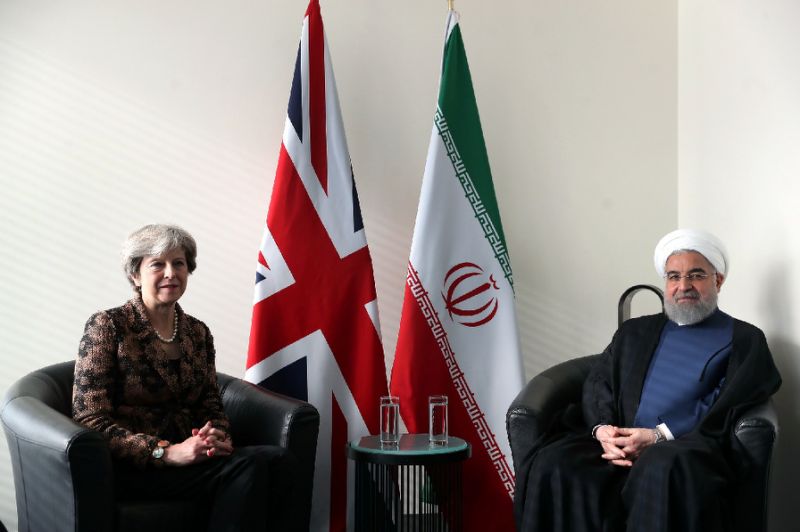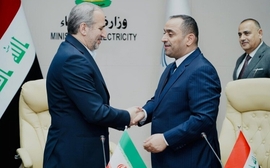The Iranian president has called on the British PM to expand bilateral banking and economic cooperation in the face of sanctions by the United States.
“Expansion of banking cooperation between the two countries can lead to further development of economic and trade ties between the two sides as well as joint investment,” Iran’s President Hassan Rouhani told British Prime Minister Theresa May in New York on Tuesday, on the sidelines of the 73rd United Nations General Assembly.
Rouhani referred to the United States’ withdrawal from the 2015 nuclear agreement on May 8, saying that “we should work hard to deepen cooperation and consultation to achieve an appropriate practical framework for maintaining and fully implementing this agreement, especially in economic sectors,” according to his official website.
In turn, Theresa May reiterated the U.K.’s commitment to the Joint Comprehensive Plan of Action – the formal name for the deal – noting that as long as Iran abided by its obligations under the deal, the British government would continue to take steps to ensure that Iran receives economic benefits from sanctions relief.
On September 24, Lord Norman Lamont, the British trade envoy to Iran, told Gholamhossein Shafei, the president of the Iran Chamber of Commerce, Industries, Mines and Agriculture, that "Iran and markets around the country are of utmost importance to the British government and we hope to have an effective presence in these markets. The UK is striving to continue its cooperation with Iran in the fields of health and medicines," he said.
The Iranian economy is suffering from the U.S. sanctions that were re-imposed following Trump’s withdrawal from the deal. The U.S. has threatened to punish companies from other nations that continue doing business with Iran and has forced companies across Europe to reconsider their investments in Iran.
On September 24, the foreign ministers from Britain, France, Germany, Russia, China and Iran agreed to establish a financial facility in the European Union to facilitate payments for Iranian imports and exports, including oil, to skirt American banking sanctions. The so-called “Special Purpose Vehicle” will assist and reassure economic operators pursuing legitimate business with Iran.
At a UN Security Council meeting on Wednesday, Trump asked all nations to isolate Iran's leadership, and vowed that more sanctions will follow after the resumption of oil sanctions on November 5.
He added that Washington would make sure that Iran, the “world's leading sponsor of terror,” which fuels “conflict around the region and far beyond, will never be able to acquire nuclear weapons, warning that sanctions against Iran would be 'tougher than ever before.”
The European Union's updated Blocking Statute entered into force on August 7 to protect EU companies doing legitimate business with Iran from the impact of “extra-territorial sanctions.” The EU’s blocking statute forbids EU firms from complying with American sanctions, allowing them to recover damages from such penalties and nullifying any foreign court rulings against them.
Swedish truck maker AB Volvo has stopped assembling trucks in Iran because the sanctions are preventing it from being paid. Volvo was working with Saipa Diesel, part of Iran’s second-largest automaker SAIPA, which was assembling the Swedish firm’s heavy-duty trucks from kits shipped to Iran.
Another Swedish truck maker, Scania, said it had canceled all orders that it could not deliver by mid-August due to sanctions, while French carmaker PSA Group began to suspend its joint venture activities in Iran in June. Meanwhile, the German carmaker Volkswagen has rejected a report that suggested it had decided against doing business in Iran.
U.S. sanctions kicked back into gear in August and started with limitations on Iran’s access to the global financial system. Some experts are forecasting that the sanctions to come in November could remove up to 1.5 million barrels per day of crude oil from the global market. This speculation caused the global benchmark Brent crude to jump more than three percent on Monday to a four-year high, above $80 a barrel.







 Russian peacekeeping forces, deployed in the Karabakh (Garabagh) region of Azerbaijan since 2020, have commenced their withdrawal from the area.
Russian peacekeeping forces, deployed in the Karabakh (Garabagh) region of Azerbaijan since 2020, have commenced their withdrawal from the area.
 The number of evacuees from flooded areas in Kazakhstan has reached 97,852 people, including about 32,856 children since March 27.
The number of evacuees from flooded areas in Kazakhstan has reached 97,852 people, including about 32,856 children since March 27.
 The Islamic holy month of fasting, Ramadan comes to an end this week with the celebration of a joyous festival called Eid (meaning “festival” in Ar...
The Islamic holy month of fasting, Ramadan comes to an end this week with the celebration of a joyous festival called Eid (meaning “festival” in Ar...
 Azerbaijan officially unveiled the logo for the upcoming 29th session of the Conference of the Parties to the United Nations Framework Convention o...
Azerbaijan officially unveiled the logo for the upcoming 29th session of the Conference of the Parties to the United Nations Framework Convention o...



